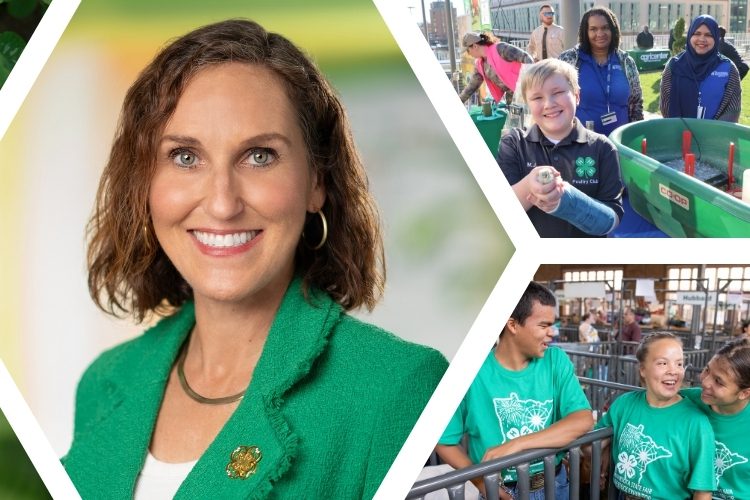As the President and CEO of National 4-H Council, Jill Bramble brings a wealth of experience and a deep commitment to the organization’s mission. She is a fourth generation 4-H alumna who rose through the ranks of National 4-H Council starting as a grant writer to the top leadership position. Throughout her time at National 4-H Council, Bramble has consistently demonstrated her dedication to empowering young people, fostering innovation, and strengthening partnerships.
What is 4-H?
 4-H is America’s largest youth development organization, empowering nearly 6 million young people each year to thrive through hands-on learning experiences. Through 4-H, youth develop essential life skills, leadership, and the confidence they need to be ready for both work and life. 4-H is delivered by Cooperative Extension, reaching kids in every county and parish in the United States, and guided by caring adult mentors who nurture their potential. Together, we’re preparing youth to build our community’s future.
4-H is America’s largest youth development organization, empowering nearly 6 million young people each year to thrive through hands-on learning experiences. Through 4-H, youth develop essential life skills, leadership, and the confidence they need to be ready for both work and life. 4-H is delivered by Cooperative Extension, reaching kids in every county and parish in the United States, and guided by caring adult mentors who nurture their potential. Together, we’re preparing youth to build our community’s future.
Since our founding in 1902, 4-H has recognized youth as powerful agents of technological change, beginning with young people teaching adults about emerging agricultural innovations. Everything we rely on – our food, fuel, and fiber – starts with agriculture. This industry doesn’t just power our economy; it’s the foundation of our entire way of life.
How do youth benefit from 4-H?
4-H equips youth with the skills and confidence to thrive in a technology-driven world. They build resilience and become ready for the future of work and life through hands-on learning in areas such as STEAM, agriculture, civic engagement, and healthy living. Through these experiences, youth explore potential careers and develop essential life skills, such as teamwork, adaptability, problem-solving, and leadership. 4-H empowers youth to become active, engaged members of their communities and pioneer solutions to global challenges. According to a recent survey, 4-H programming has a positive impact on young people:
● 4-H’ers are 40% more likely than other youth to pursue a college degree
● 4-H’ers are 2x more likely to obtain vocational or technical training or serve in the military
● 4-Her’s feel more confident reaching life goals such as owning a home, being debt-free or starting a business
What is the Beyond Ready campaign?
With partnerships with 110 land-grant universities and an extensive network of local and national collaborators, 4-H stands as a vital force in cultivating work and life readiness. Our latest initiative, Beyond Ready, takes this mission further, aiming to empower 10 million youth by 2030 to tackle the future head-on. The job gap continues to grow, with more than 10 million open jobs in the U.S. and too few young people equipped with the skills needed to fill them, 4-H is meeting the moment by mobilizing our entire system to close that gap.
We believe a ready generation is one that is healthy, productive, and engaged. Through Beyond Ready, we’re helping youth build skills in communication, teamwork, problem-solving, and adaptability alongside academic and technical knowledge.
The initiative focuses on three key strategies:
● Expanding Academic and Career Readiness for youth through real-world, hands-on learning experiences;
● Investing in Educators by providing training, tools, and resources. We know schools can’t do it alone;
● Mobilizing the Network to elevate youth voices, deepen local partnerships, and scale what works.
4-H is an important part of the Cooperative Extension System. How does it fit into the rest of Cooperative Extension’s work?
With Cooperative Extension at the core, Beyond Ready is how 4-H will reach more young people with high-quality experiences and build a generation that’s ready to tackle whatever comes next.
As part of Extension’s mission to serve communities with lifelong, research-backed learning, 4-H plays a unique role in preparing youth to lead and thrive. What sets 4-H apart is the local knowledge and deep community relationships of Extension educators and volunteers, who ensure programs are responsive to the real needs of young people. Together, they bring 4-H’s proven model to life – building the next generation of leaders, problem-solvers, and changemakers.
How do 4-H experiences impact alumni’s paths to professional leadership roles?
4-H alumni consistently tell us their earliest leadership experiences came through 4-H. If they led a community service project, presented their project at a county fair, or facilitated a workshop for younger members, these formative opportunities helped them discover their voice, build confidence, and develop a strong sense of purpose. Many of our alumni credit 4-H with shaping their career choices and giving them the skills that propelled them into leadership roles. According to 4-H research, 78% of alumni reported that 4-H helped them succeed in their careers, while 53% stated 4-H had a significant impact on their career choices.
4-H alumni are community advocates who are more likely to donate and volunteer regularly – 91% said their 4-H experience helped them become good citizens. In comparison, 78% reported developing skills that help them feel comfortable in leadership roles.
How does 4-H strengthen Cooperative Extension’s impact?
4-H plays a vital role amplifying the impact of Cooperative Extension by building strong, early connections with young people, their families, and community mentors. Through 4-H, Extension has a visible and lasting presence in the lives of youth, often introducing them to science-based learning and community engagement as early as five years old. These relationships often extend to parents, educators, and local community and business leaders, expanding Extension’s reach and strengthening trust across the community. Because 4-H is grounded in local context and driven by national research, it serves as a bridge between land-grant universities and the communities they serve, helping Cooperative Extension fulfill its mission to improve lives through education.
What kinds of other student experiences are important to prepare college students for the workforce?
Internships, capstone projects, and service-learning help students apply what they learn in the classroom to actual challenges in the workforce. Experiences that teach 21st Century skills – adaptability, critical thinking, and cross-disciplinary collaboration – are increasingly important.
Youth-led innovation is powered by artificial intelligence. Led by Extension, we’re listening to young people’s perspectives on AI, understanding how they interact with and envision using these new tools. Through our CLOVER platform, we’re scaling this hands-on, empowering approach to help youth across the country harness AI technology.
Last year, in partnership with Microsoft, we released a groundbreaking study on the use of generative AI among young people. Key findings revealed:
● Young people have a sophisticated understanding of AI concepts
● They desire adult guidance in navigating AI tools
● While leveraging AI for schoolwork, they’re conscious of ethical concerns around cheating and privacy
What advice would you give to today’s youth and college students?
Lean into every opportunity to learn about yourself and the world around you. Say yes to projects outside your comfort zone. Surround yourself with people who challenge and support you. Most importantly, know that your voice matters. You don’t need to have it all figured out right now. What matters is your willingness to grow, to lead with purpose, and to stay curious about what’s possible. Also, you don’t have to grow up on a farm to build a future in agriculture. Our programs open doors to exciting careers in technology, agriscience, and engineering.
“Growing Together: Conversations with CEOs” showcases Presidents and CEOs of national agricultural associations, commodity groups, and other organizations and explores their powerful synergies with land-grant universities. Through conversations with leaders, this new interview series examines how organizations strengthened their impact in partnerships with Colleges of Agriculture and Natural Resources’ research, education, and Cooperative Extension. These interviews also highlight emerging opportunities to leverage collaboration, drive innovation, and serve all Americans.
Share this Post

